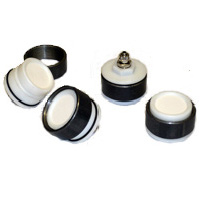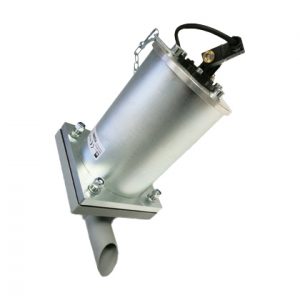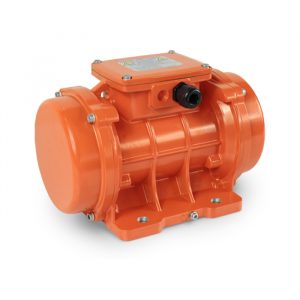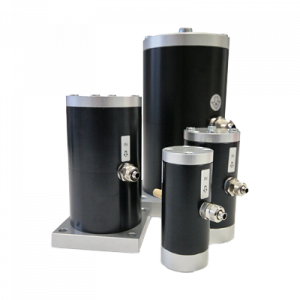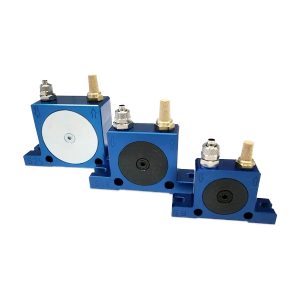Maintaining Smooth Flow: Avoiding Blockages in Bulk Material with Flow Aids
Industrial bulk-handling processes are the backbone of numerous industries in Australia, however, one common challenge faced in these operations is material clogging, which can lead to downtime, decreased productivity & increased maintenance costs.
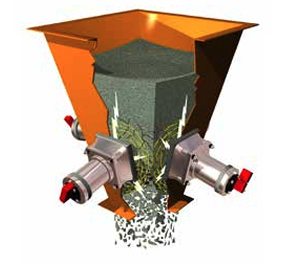
Industrial bulk handling processes are the backbone of numerous industries in Australia, from mining to food processing. However, one common challenge faced in these operations is material clogging, which can lead to downtime, decreased productivity, and increased maintenance costs. Fortunately, advancements in technology have paved the way for effective solutions, and one such solution is the implementation of Flow Aid products, such as those offered by OLI.
In this article, we explain the significance of preventing material clogs in industrial bulk handling and how flow aids play a vital role in achieving smooth and uninterrupted operations.
The Challenge of Material Clogs
Industrial bulk handling involves the movement of large quantities of materials such as powders, granules & aggregates. These materials often have varying properties, including particle size, shape, and moisture content, making them susceptible to clogging during storage, transportation & processing. Material clogs can occur in hoppers, chutes, conveyor belts, and other equipment, disrupting the flow and causing operational blockages.
Industrial bulk material handling systems can face various types of blockages, which can disrupt the smooth flow of materials and cause operational inefficiencies. Some common types of blockages include:
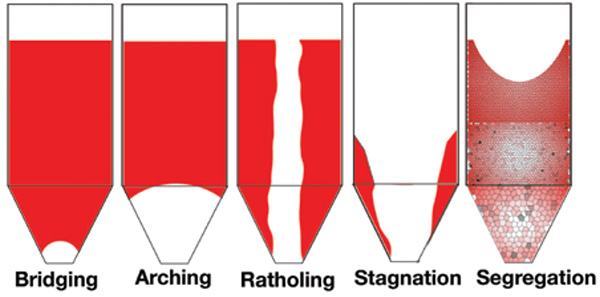
Bridge Formation
This occurs when material forms a bridge over an opening, such as a hopper outlet or chute, preventing the material below from flowing freely. It’s common with cohesive materials like clay, powders, or fine granular materials.
Ratholing
Ratholing happens when material channels down the center of a storage vessel or bin, leaving material stagnant along the walls. This can lead to uneven flow rates and incomplete discharge.
Arching
Similar to bridging, arching occurs when material forms an arch over an opening. It’s often caused by the cohesive forces between particles and can obstruct material flow from hoppers, bins, or silos.
Pluggage
Pluggage refers to the complete obstruction of a passage or chute due to the accumulation of material. It can be caused by material buildup, compaction, or foreign objects entering the system.
Segregation
Material segregation is the separation of different particle sizes or types during handling, resulting in uneven distribution and flow. This can lead to blockages, especially in systems with narrow passages or chutes.
Moisture-induced Caking
Moisture can cause certain materials to cake or clump together, leading to blockages in conveyors, hoppers, or bins. This is common in hygroscopic materials that absorb moisture from the air.
Freezing
In cold climates, moisture in bulk materials can freeze, causing blockages in conveyors, chutes, or storage vessels. This is particularly problematic for materials with high moisture content.
Mechanical Obstructions
Foreign objects or debris can inadvertently enter the material handling system, causing blockages in conveyors, chutes, or processing equipment.
Airlock Failure
In pneumatic conveying systems, airlocks are used to regulate the flow of material. If an airlock malfunctions or becomes blocked, it can disrupt material flow and cause blockages in the system.
Equipment Malfunctions
Mechanical failures or malfunctions in equipment such as feeders, crushers, or screens can lead to blockages in the material handling system.
Preventing and managing these blockages requires careful design, maintenance, and monitoring of industrial bulk material handling systems. Regular inspections, proper equipment selection, and implementing appropriate material handling techniques, like flow aids, can help mitigate the risk of blockages and ensure smooth operations.
Material clogs not only hinder the efficiency of production processes but also pose safety risks. Accumulated material blockages can lead to equipment overloads, unexpected shutdowns, and even equipment damage. Additionally, the manual clearing of clogs exposes workers to hazardous conditions and can result in workplace injuries.
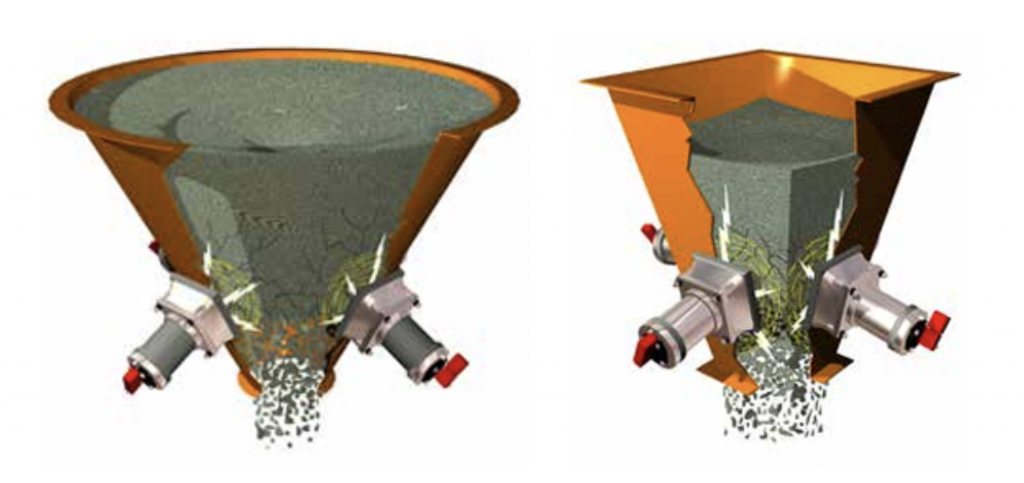
Benefits of Flow Aid Products
Flow aid products are specifically designed to address the challenges associated with material clogs in industrial bulk handling applications. These products utilise various mechanisms to enhance material flow & prevent clogging. One of the leading providers of flow aid solutions is OLI, renowned for its innovative and reliable products tailored to meet the diverse needs of Australian industrial operations.
OLI flow aid products encompass a range of technologies, including air cannons, aerators, pneumatic vibrators, and electric vibrators, each designed for specific applications and environments. These devices work by imparting energy to the material, loosening it in turn promoting flow without the need for manual intervention. By integrating flow aid products into bulk handling systems, industries can significantly reduce downtime, enhance productivity, and improve safety.
Increased Efficiency
By preventing material clogs, flow aid products ensure a continuous and uniform flow of materials throughout the handling process, optimising operational efficiency.
Reduced Maintenance Costs
Minimising material blockages translates to less frequent equipment downtime and maintenance, leading to cost savings for industrial facilities.
Enhanced Safety
Eliminating the need for manual clearing of clogs reduces the risk of workplace accidents and ensures a safer working environment for personnel.
Versatility
Flow aid products are available in a variety of configurations to suit different material types, handling conditions, and equipment requirements, providing versatile solutions for diverse industrial applications.
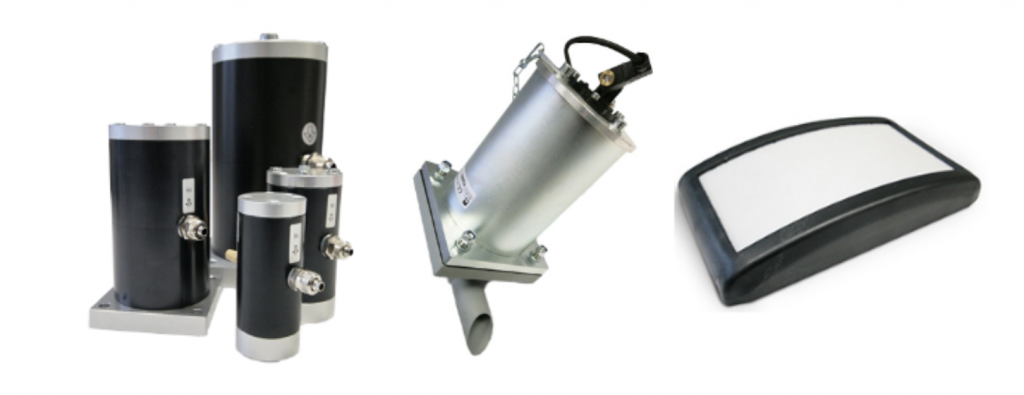
The Role of Flow Aid Products
In the industrial bulk handling industry, preventing material clogs is paramount to ensuring smooth and efficient operations. Flow aid products offer a cost-effective, reliable solution to this challenge, enabling industries to overcome material flow issues and maximise productivity. By investing in innovative technologies from trusted providers like OLI, industrial facilities can streamline their bulk handling processes, minimise downtime, and achieve sustainable growth in today’s competitive landscape.
Related Products
Inquip supplies the market leading OLI range of Flow Aids. The product range is divided into Aerator Pads and Nozzles, Vibro-Aerators, Air Cannons, Combined Hammer Blasters, Pneumatic Linear Vibrators and Pneumatic Rotary Vibrators.

